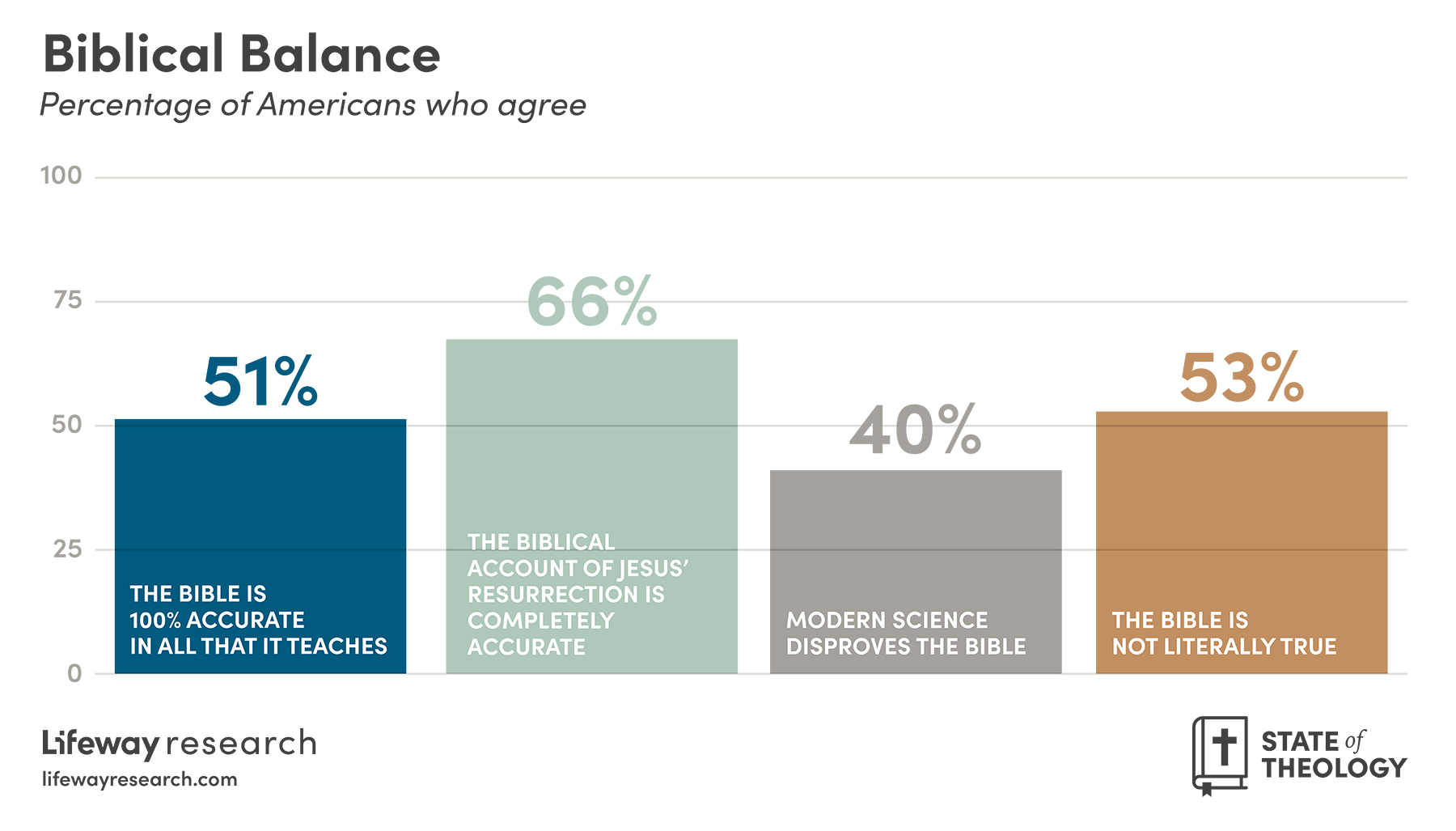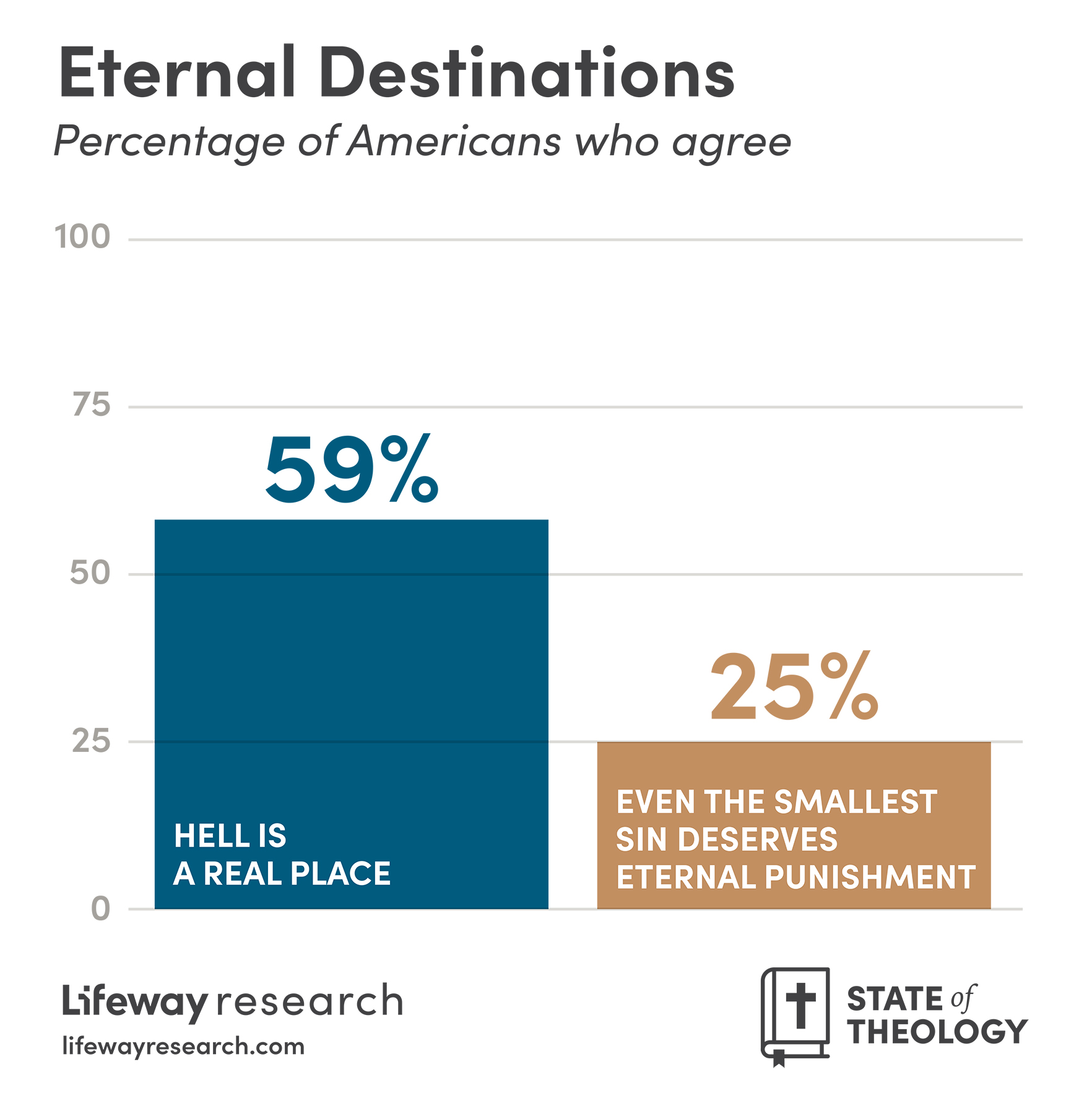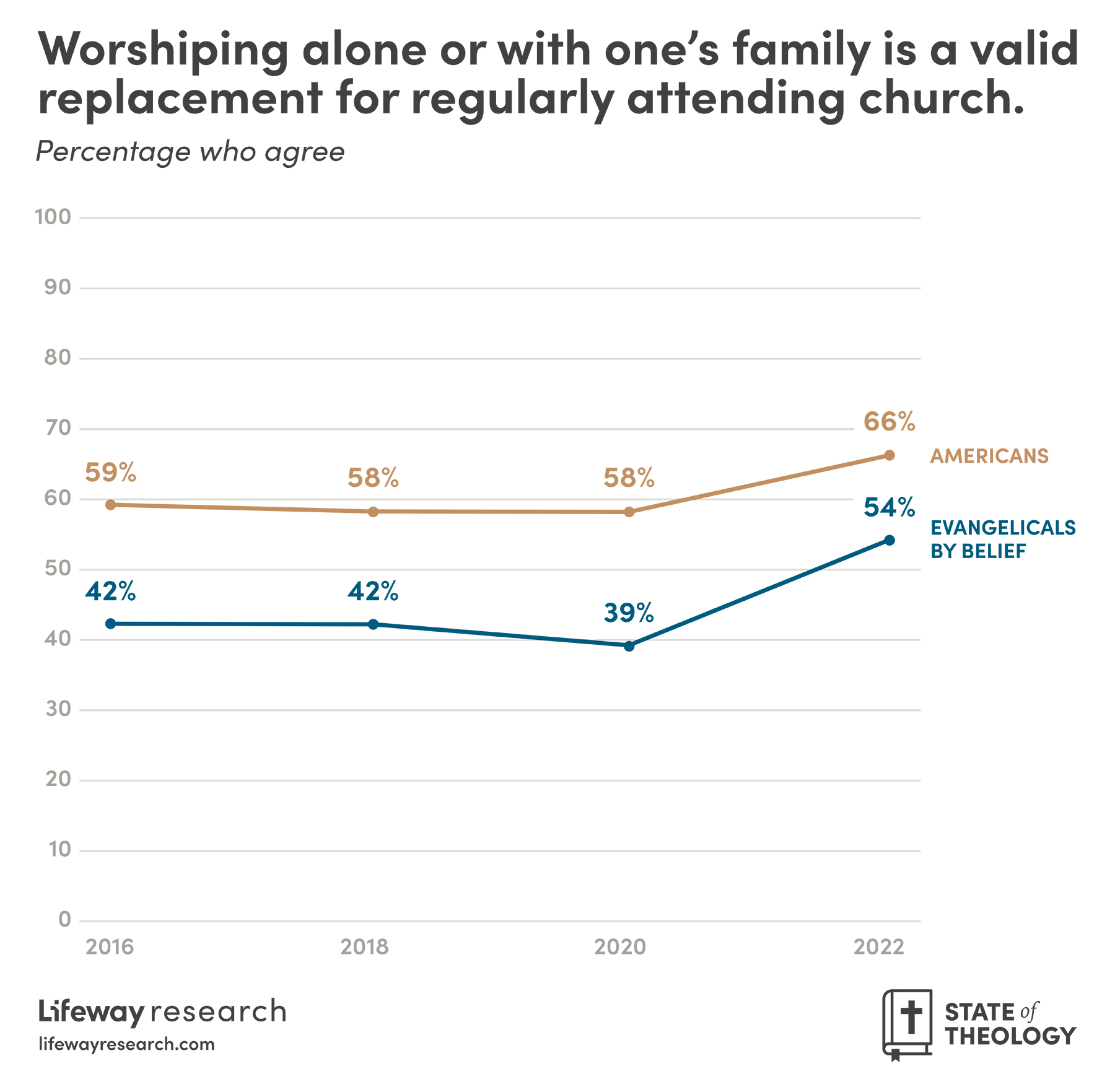The 2022 State of Theology study, sponsored by Ligonier Ministries, surveyed more than 3,000 Americans. With many theological beliefs remaining stable, those that did shift point to areas where a changing U.S. culture may be impacting Americans’ religious perspectives.
In 2022, 71% of polled U.S. adults agreed with the statement that "Everyone is born innocent in the eyes of God." While this is unsurprising, given the influence of humanistic philosophies and worldviews in America that teach self-determinism and a view of humankind as basically good, the survey also showed that 65 percent of polled evangelical Christians agreed with this same statement.
The fact that nearly two-thirds of U.S. evangelicals believe that humans are born in a state of innocence reveals that the biblical teaching of original sin is not embraced by most evangelicals. The Bible, however, makes clear that all humans are "by nature children of wrath" (Eph. 2:3). In other words, we are not sinners because we sin; rather, we sin because we are sinners. This truth is foundational for an accurate understanding of the gospel and of our absolute need for the grace of God in salvation.
Chris Larson, president and CEO of Ligonier Ministries, said:
"Absent an understanding of the holiness of God, it is unsurprising that most people do not acknowledge the depth of their sinfulness or their need for a Savior. Yet, the fact that many Christians have been so poorly or wrongly taught on this most basic of doctrines is jarring. It was Ligonier's founder, Dr. R.C. Sproul, who often reminded us that our corruption is a radical corruption, because it goes right to the root of our humanity. It affects every part of our character and being. We must come to terms with who we are by nature—violators of God's law who are justly exposed to His wrath, having no hope of forgiveness apart from His mercy in Jesus Christ. We aim for the results of the 2022 State of Theology survey to serve as a wake-up call to rouse Christians to more serious and active discipleship in the Scriptures. Eternal life and death are at stake, and we cannot afford to treat lightly that which God has revealed with utmost gravity."
God-sized confusion
Most Americans believe in God, but they’re a little confused about who the divine is.
- While 66% of U.S. adults say God is a perfect being and cannot make mistakes, half (51%) say God learns and adapts to different circumstances.
- Almost 7 in 10 Americans (67%) say God accepts the worship of all religions, including Christianity, Judaism and Islam. A similar percentage (71%) say there is one true God in three persons: God the Father, God the Son and God the Holy Spirit.
- Despite a majority of Americans affirming a Trinitarian God with three divine persons, most still aren’t sure about how that applies to Jesus or the Holy Spirit. Slightly more than half (55%) believe Jesus is the first and greatest created being. Another 53% say He was a great teacher but not God. Close to 3 in 5 (59%) believe the Holy Spirit is a force but not a personal being.
- When thinking about these theological convictions, most Americans classify them as opinions not facts. For 60% of U.S. adults, religious belief is a matter of personal opinion; it’s not objective truth.
“Many Americans think about God as if He had only revealed himself in a vague, nondescript way. They seem to fill in the gaps with whatever they want to believe,” said McConnell. “This creates sharp contrasts between what Americans believe about God and how He revealed himself in great detail in the Bible.”
Three in 10 Americans (30%) say Christians should stay silent on political issues, an increase from 24% in 2020 and the highest percentage recorded in any previous State of Theology study. Around 3 in 5 Americans (61%) disagree.
“Discussions of sin are inherently theological, because they explore whether God set standards and what behaviors miss this mark,” said McConnell. “So, those who acknowledge certain behaviors as sin are acknowledging a deity’s standards. This is a different discussion than whether society agrees on an ethical standard of conduct that we determine.”

Eternal destinations
Americans believe God cares about what we do each day, most people are generally good, but hell is a real place where some people will spend eternity in punishment.
While 58% of U.S. adults disagree, a growing number believe God is unconcerned with their day-to-day decisions. Around a third of Americans (32%) say God isn’t concerned with what they do on a daily basis, up from 25% in 2020 and the highest since the State of Theology first asked the question in 2014.
As people consider their actions and their nature, most believe they’re naturally good and start off innocent before God. Two in 3 Americans (66%) say everyone sins a little, but most people are good by nature. Seven in 10 (71%) say everyone is born innocent in the eyes of God.

Still, 3 in 5 Americans (59%) say hell is a real place where certain people will be punished forever, up from 56% in 2020 and 54% in 2018. A quarter (25%) also believe even the smallest sin deserves eternal damnation, consistent with the 26% from 2020 after climbing up in each State of Theology study starting at 18% in 2014.
“An interesting paradox exists regarding Americans’ views of sin and punishment,” said McConnell. “More than two-thirds of Americans believe everyone is inherently good, yet almost as many believe divine judgement will occur in the future.”
Biblical balance
Americans tend to trust the Bible, especially what it teaches about Jesus, but may have some doubts in other areas.
Two in 3 U.S. adults (66%) say biblical accounts of the physical or bodily resurrection of Jesus are completely accurate. They believe the event actually occurred.
And Americans do not believe the Holy Spirit will contradict Scripture. More than 3 in 5 (62%) don’t believe the Holy Spirit can tell them to do something that is forbidden in the Bible.
In many ways, Americans are split on the trustworthiness of the Bible. Around half say the Bible is 100% accurate in all that it teaches (51%) and the Bible has the authority to tell us what to do (52%); however, 53% of Americans say the Bible, like all sacred writings, contains helpful accounts of ancient myths but is not literally true. And 40% say modern science disproves the Bible.
“As a society, views on the Bible probably best summarize how split Americans are when it comes to theology,” said McConnell. “Half see Scripture as dependable and authoritative while half see it as fiction. Higher numbers acknowledge the story it tells, but more than half also give weight to their personal opinions.”
Americans experienced seismic changes over the past two years, including, for many, how they attend church. The shift in behavior coincides with a shift in theology.
Going to church?
The biennial State of Theology study conducted by Lifeway Research found relative stability in some of the religious and cultural beliefs U.S. adults hold. After months of quarantines and social distancing, however, Americans increasingly believe worshiping apart from a church is as good as attending church services.
In March 2020, as the COVID-19 pandemic was just beginning in the United States, 58% of Americans said worshipping alone or with one’s family was a valid replacement for regularly attending church, with 26% strongly agreeing. In 2022, 66% believe worshiping apart from a local congregation is as valid as worshiping with one, with 35% strongly agreeing.
Additionally, most Americans (56%) don’t believe every Christian has an obligation to join a local church. Fewer than 2 in 5 (36%) say this is something all Christians should do.
Tracking surveys from Lifeway Research throughout the pandemic found U.S. Protestant churches were open at pre-pandemic levels by summer of 2021 and into 2022, but early this year few churches had reached pre-pandemic attendance levels.
“Religious identity, beliefs and behavior are interrelated,” said Scott McConnell, executive director of Lifeway Research. “When in-person church attendance behaviors were interrupted and habits were broken, it affected some Americans’ beliefs about the need to gather with other believers to worship.”

